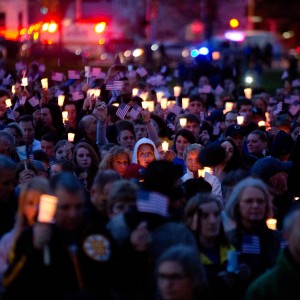It was not just Boston that was hurt by bombs on Monday.
My hometown, Ashland, Mass., is the original start of the Boston Marathon. Currently, the Marathon spirals from Hopkinton, Mass., through the heart of Ashland, Route 135. The Boston Marathon is scheduled purposefully on Patriots’ Day, a state holiday, and many spend their day watching the marathon from the sidelines or even volunteering at the event. It is common for Route 135 to be lined with spectators, cheering on the runners, handing out bottled water and orange slices.

As somebody who grew up right near the marathon route, I have countless memories of dragging down lawn chairs, handing out water bottles and collecting discarded clothing from passing runners along with members of the Massachusetts community. This is a memory that many people from Massachusetts — and Ashland — share.
This is why the Boston Marathon bombing is so upsetting — it has threatened a community that has existed for more than 100 years. While its physical presence is in Eastern Mass., it is an international community that is centered on the celebration of athleticism. It is a tradition that echoes throughout generations of Bostonians. It is a landmark event for one of the first states of America.
Despite the efforts of those who attacked Beantown, that community only grew Monday. Though cell phone communications were temporarily shut down, many used social media to reach out to marathon attendees. To help those searching for loved ones, Google launched a Boston Marathon Person Finder, a database for people to research the status of their loved ones. Tweets, Facebook posts and Instagram pictures were also used to track the chaos of the attack. Police are even using social media to find video of the attack using the hashtag “#tweetfromthebeat.”
New York City inhabitants popularized a “NY hearts Boston” graphic. Ellen DeGenneres, Patton Oswalt and Craig Ferguson expressed their sympathy and pain through the media. Even the New York Yankees, longtime rivals of the Boston Red Sox, played “Sweet Caroline” after their third inning in honor of Boston, and if that doesn’t show the rise of a closer community, I don’t know what does.
There is no denying that damage was done on Monday. People were hurt, lives were lost and hearts go out to everyone who was injured and to everyone who lost a loved one. Many call out for justice, and many search for those who committed this act of terror. Some even cry out for a counterattack.
Yet, perhaps the best justice is to show strength in numbers and, in turn, in community. By continuing to reach out to those affected, whether in person or through social media, we have the most effective counterattack of all.
As a Bostonian, my heart aches for my city. My heart aches for Krystle Campbell, Lu Lingzi and Martin Richard and those currently unidentified. My heart aches for the runners, the volunteers, the spectators and the community that set aside their day to support its members. My heart aches for the city that has done nothing but stand for life, liberty and the pursuit of happiness.
We are a great city, and more importantly, we are a great people. Not just those of Boston, but everyone who has ever participated in the Boston Marathon. We have been struck by tragedy, but through the strength of our community, we will get through this. We will rise, we will survive, and that alone can be our justice.







